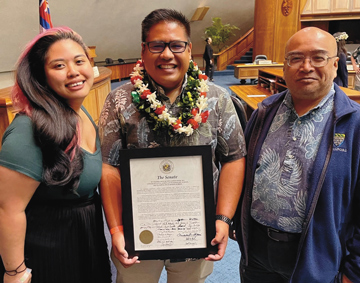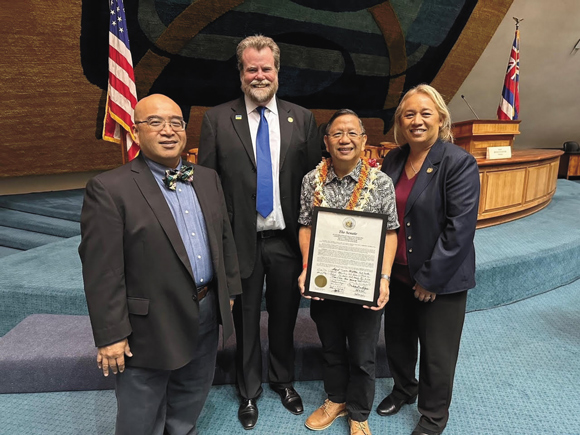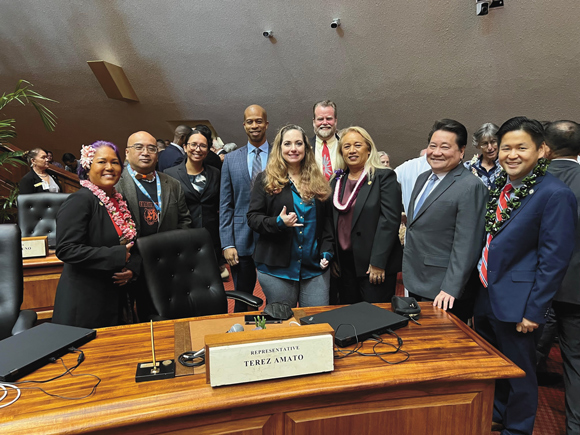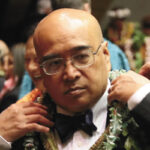
Filipinos Who Serve, or Not Serve, in Our Government
Gilbert S.C. Keith-Agaran
In 2018, I wrote in this column I was the only Filipino legislator in the Maui delegation. With Elle Cochran (West Maui) discovering in recent years she has Filipino heritage, now we have two. That’s progress.
In that 29th Legislature, there weren’t many of us statewide. Of the twenty-five Senators, we had six: Donovan DelaCruz (Wahiawā), Brickwood Galuteria (Waikīkī-Kaka‘ako), Donna Mercado Kim (Kalihi Valley, Moanalua), Will Espero (Ewa Beach), Lorraine Inouye (Kona-Kohala) and me. In this 32nd Legislature, Henry Aquino (Pearl City-Waipahu), Brandon Elefante (Pearl City-‘Aiea) and Joy San Buenaventura (Puna) have joined Donovan, Donna, Lorraine and me to bring our caucus numbers to seven (both Will and Brick having departed). Senators are now out-numbered in the fifty-one member House of Representatives where there are ten kababayan: Della Au Belatti (Makiki), Micah Aiu (Foster Village), David Alcos (Ewa Beach), Cochran, Sonny Ganaden (Kalihi), Diamond Garcia (Varona Village-Ewa), Greggor Ilagan (Hawaiian Paradise Park), Rachele Lamosao (Waipahu), Rose Martinez (Ewa Beach) and Trish La Chica (Waipi‘o-Mililani). There are some with Filipino spouses or significant others: Justin Woodson (Kahului) and John Mizuno (Kalihi), and perhaps others.

Image courtesy Gil Keith-Agaran
In the Senate, Filipinos now hold posts with some responsibility. DelaCruz chairs the powerful Ways and Means (WAM) committee that determines the State budget (Upcountry Maui’s Kyle Yamashita now chairs the House Finance committee). Kim, Inouye, Aquino and I all sit on WAM while Cochran, Lamosao, Aiu and Alcos have Finance seats as freshmen. Inouye chairs the influential Water Land committee with Elefante as Vice Chair, Kim chairs Higher Education and serves as Education committee Vice Chair, and San Buenaventura chairs Health and Human Services and holds a seat on the Judiciary committee. Dela Cruz, Aquino, Inouye and I also sit on Senate leadership. In the lower chamber, Ilagan now often presides over the House as Vice Speaker, and Belatti chairs the important Health committee.
Some of us represent areas where you expect to find sizable Pinoy populace—our homelands of Kalihi, Waipahu, Ewa Beach and Kahului.
Contrary to what some critics of Hawai‘i politics would argue, Valley Isle voters have been fairly selective in returning legislators to office. For Maui, with only nine Senators and Representatives in the seventy-six member Legislature, stability has been a sporadic occurrence. For every Joe Souki who spent decades in the House, there are the single or brief terms of Kam Tanaka, George Fontaine, Tina Wildberger and Kika Butkowski.

Image courtesy Gil Keith-Agaran
In 2006, Maui County’s legislative delegation included Joe Souki (House Dist. 8), Bob Nakasone (House Dist. 9), Tanaka (House Dist. 10), Chris Halford (House Dist. 11), Kyle Yamashita (House Dist. 12), D. Mele Carroll (House Dist. 13), Shan Tsutsui (Sen. Dist. 4), J. Kalani English (Sen. Dist. 6) and Roz Baker (Sen. Dist. 5).
After the General Election, Tsutsui won a rematch with former Sen. Jan Yagi Buen while Tanaka lost to Angus McKelvey. Tanaka himself in 2004 ousted incumbent Brian Blundell while Yamashita won a rematch for the Upcountry seat with incumbent Kika Butkowski (in doing so, Yamashita perfected a Haleakalā Highway sign waving technique often imitated but rarely successfully copied). Carroll was appointed to the East Maui-Molokai-Lāna‘i seat to replace Sol Kaho‘ohalahala who resigned to work for the Kaho‘olawe Island Reserve Commission in 2005.
The delegation remained intact in the 2008 election. Nakasone, however, sadly passed away after winning re-election and Gov. Linda Lingle appointed me to his Kahului House seat.
In 2010, Bertram lost a rematch to George Fontaine for the South Maui seat.
Two years later, Kaniela Ing ousted George Fontaine. After a couple of terms, Ing lost a race for U.S. Congress and Tina Wildberger took the seat.
2012 also marked the passing of U.S. Senator Daniel K. Inouye. With Brian Schatz tapped for Washington, D.C., Shan Tsutsui moved to the Lt. Governor’s office and Gov. Abercrombie appointed me to the State Senate in his place. The Governor also picked Justin Woodson to take my seat in the House.
Another change happened when Carroll succumbed to cancer in 2015. Gov. David Ige appointed Lynn DeCoite to the canoe district. Ige later appointed DeCoite to J. Kalani English’s Senate when English retired from the Legislature. Troy Hashimoto was then appointed to represent Wailuku when Souki left the House.
This past November elections resulted in Maui’s House delegation being split between the male veterans (Yamashita, Woodson and Hashimoto) and new women legislators (Cochran, Terez Amato (S. Maui) and Mahina Poepoe (E. Maui- Molokai-Lāna‘i)), while McKelvey replaced the retired Roz Baker in the upper chamber.
Until this year, one thing did not change. I’ve been the only Filipino member of the delegation. As noted above, now we have two. Based on our population, people would expect more. But unlike an election for County Council or for Mayor where all voters can cast a vote for any of the offices on the ballot, legislative seats are decided by the registered voters who live in a particular district. Kahului people vote for District 9 (Woodson), Wailuku people for District 10 (Hashimoto), Upcountry residents for District 12 (Yamashita) and so on. Cochran holds the West Maui seat and undoubtedly Lahaina voters were familiar with her from her years on the County Council and may still not know she has some Filipino blood.
But even when voting County wide, Filipinos have not filled many Council seats either.
As long as I remember, there have been just a handful of Filipinos who’ve served on the Maui County Council.

Photo courtesy Gil Keith-Agaran
Pablo Caldito. At one time, Vince Bagoyo and Rick Medina served at the same time, and in more recent times, Danny Mateo, Joe Pontanilla, and recently, Don Guzman and Alika Atay. Currently Shane Sinenci and Keani Rawlins-Fernandez are the only ones on the Eighth Floor who could say Mabuhay.
There certainly were Filipino and part-Filipino candidates throughout the last twelve years. Some appealed more directly to their fellow Filipinos. Others campaigned more broadly. The latter generally were more successful and that makes sense. Filipinos may make up a considerable proportion of various neighborhoods but not everyone is registered to vote or does vote. Why else would some candidates dismiss the Filipino population as expendable since they can always move back to the Philippines.
Since Republicans and other smaller political parties have a challenge to even field candidates, legislative seats are usually settled in the Democratic Primary Election (except apparently this year in West O‘ahu where Republicans Garcia and Alcos won seats, along with Lamosao and Martinez; LaChica was appointed by Governor Green). But the observation remains that in a horse race, the Democratic Nominee would be favored.
Anecdotally, for whatever reason, the Bayanihan vote has not shown up in proportion to our population in Primaries. People used to suggest Filipinos work on weekends and the Primary is always held on a Saturday. The observation, however, has persisted even as the Legislature made absentee voting easier over the years. Hawai‘i is among the states that allowed “no excuse” absentee voting (vote by mail used to be reserved for people who would be out-of-state on Election Day). The State also began to allow early Walk In voting in addition to Absentee Mail and showing up at the polls. In 2016, people could show up at Absentee Walk site and take advantage of same day registration and voting.
Now that Hawai‘i has moved to all mail elections (with limited election day voting), the verdict is still out on Filipino participation.
But beyond numbers in the Legislature, I’ve been pleasantly surprised—now that people are returning to the Capitol in person—at the number of Filipinos (young and old) who come to testify representing various professions and backgrounds (students, scientists, doctors, nurses, lawyers, farmers, business people, clergy, academics, and others). Whether election numbers reflect our population, more Filipinos are engaging in civic life. And that’s a good thing.
 Gilbert S.C. Keith-Agaran represents Central Maui in the State Senate. He served in the administration of the first Filipino Governor elected in the United States, Benjamin J. Cayetano (1995–2002). He currently serves as Vice Chair of the Senate Ways and Means Committee.
Gilbert S.C. Keith-Agaran represents Central Maui in the State Senate. He served in the administration of the first Filipino Governor elected in the United States, Benjamin J. Cayetano (1995–2002). He currently serves as Vice Chair of the Senate Ways and Means Committee.
